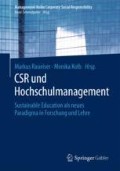Zusammenfassung
Der globale Konsens über die UN Sustainable Development Goals (SDG) ist ein signifikanter Fortschritt in der Diskussion über Nachhaltige Entwicklung, die vor mehr als vier Jahrzehnten begann (mit dem Brundtland Report 1987 als Meilenstein). Diese umfassende Agenda 2030 spezifiziert die Vision über „the future we want“. Die Beendigung extremer Armut, des Klimawandels, des Artenschwunds etc. werden zu einer fundamentalen Veränderung der ökonomischen Rahmenbedingungen führen und für viele Branchen und Unternehmen „disruptiv“ sein. In Ermangelung einer globalen Regierungsinstanz kann die erfolgreiche Implementierung der SDGs nur mit einem Konzept der „shared responsibility“ gelingen. Nicht nur staatliche Politik, sondern auch der Beitrag aller Stakeholder-Gruppen ist unverzichtbar. Im vorliegenden Aufsatz werden die (potenziellen) Rollen von Unternehmen und Hochschulen thematisiert. Im Fokus steht die Analyse der Auswirkungen von zwei Organisationen, die eng mit der UN verbunden sind – dem UN Global Compact und den Principles for Responsible Management Education (PRME). Wenngleich diese Auswirkungen schwer zu quantifizieren sind und sehr begrenzt sein dürften, ist der Ansatz, öffentlich Engagement zu bekunden, für die SDGs zu werben und gemeinsame Aktivitäten zu organisieren, geeignet, um die freiwilligen Aktivitäten von Unternehmen und von Hochschulen anzuregen und Fortschritte zu erzielen – nicht immer „disruptiv“, eher als Teil eines kontinuierlichen Verbesserungsprozesses. Solche freiwilligen Aktivitäten sind allerdings kein Ersatz für Regierungshandeln und dürfen nicht als Alibi für staatliche Untätigkeit dienen. Beide Stakeholder-Gruppen sollten vielmehr kooperieren, z. B. um verbindliche nationale Nachhaltigkeitsstrategien durchzusetzen.
Until more (economic) scholars join the public debate, the quacks will continue to dominate the pond (A. S. Blinder 1987).
Access this chapter
Tax calculation will be finalised at checkout
Purchases are for personal use only
Literatur
ISSC (International Social Science Council) (2013) World social science report 2013: changing global environments. UNESCO Publishing, Stockholm
Kühling W, Kurz R, Weiger H (2015) Forschung, bitte wenden! Wissenschaftspolitik für nachhaltige Entwicklung. In: oekom e. V. (Hrsg) Forschungswende. Wissen schaffen für die Große Transformation. Politische Ökologie Nr. 140, S 30–36
Luhmann N (1990) Ökologische Kommunikation. Kann die moderne Gesellschaft sich auf ökologische Gefährdungen einstellen? 3. Aufl. Westdeutscher Verlag, Opladen
Meadows D et al (1972) The limits to growth. Universe Books, New York
Putt del Pino S et al (2016) From Doing Better to Doing Enough: Anchoring Corporate Sustainability Targets in Science, World Resources Institute Working Paper, Washington, DC
Schneidewind U, Singer-Brodowski M (2013) Transformative Wissenschaft. Klimawandel im deutschen Wissenschafts- und Hochschulsystem. Metropolis, Marburg
WBGU (German Advisory Council on Global Change) (2011) World in transition – a social contract for sustainability. Flagship Report. WBGU, Berlin
WCED (World Commission on Environment and Development) (1987) Our common future. Oxford University Press, New York
Wenar L (2016) Blood oil. Tyrants, violence, and the rules that run the world. Oxford University Press, Oxford
Weiterführende Literatur
Bonaccorsi A (Hrsg) (2014) Knowledge, diversity and performance in European higher education. A changing landscape. Edward Elgar, Cheltenham
Buono AF, Haertle J, Kurz R (2015) UN principles for responsible management education (PRME): global context, regional implementation and the role of signatories. In: Leonard L, Gonzalez-Perez M (Hrsg) The UN global compact: fair competition and environmental and labour justice in international markets, advances in sustainability and environmental justice, Bd. 16. Emerald, Bingley, S 1–15
Kanning H, Kurz R, Pape J, Twarok J (2016) Zivilgesellschaftliche Impulse für das Hochschulsystem: Zur Rolle der Hochschulräte. Die Neue Hochsch 5:182–185
Kurz R (2014) Green growth and sustainable development. In: Moczadlo R, Šimić ML, Oberman-Peterka S (Hrsg) Regional and international competition – A challenge for companies and countries. Hochschule Pforzheim, Pforzheim, S 11–20
Kurz R (2015) Quality, obsolescence and unsustainable innovation. Ekon Vjesnik Econviews Rev Contemp Bus Entrepreneursh Econ Issues 28(2):511–522
Kurz R, Rau K-H (2009) Be a source for new theories, ideas, and attitudes. Decis Sci J Innov Educ 7(2):344–346
Nowotny H, Scott P, Gibbons M (2001) Re-thinking science. Knowledge and the public in the age of uncertainty. Blackwell, Cambridge
Sunley R, Leigh J (Hrsg) (2016) Educating for responsible management. Putting theory into practice. Greenleaf, Oxford
Thomas H et al (2014) Securing the future of management education. Competitive destruction or constructive innovation? Emerald, Bingley
UNESCO (2015) Science report: towards 2030. UNESCO, Paris
Weiger H, Kühling W, Kurz R (2015) Citizen Science und Umweltverbände – das Bürgerrecht auf Einmischung. In: Finke P (Hrsg) Freie Bürger, freie Forschung. Die Wissenschaft verlässt den Elfenbeinturm. oekom, München, S 45–49
Author information
Authors and Affiliations
Corresponding author
Editor information
Editors and Affiliations
Rights and permissions
Copyright information
© 2018 Springer-Verlag GmbH Deutschland, ein Teil von Springer Nature
About this chapter
Cite this chapter
Kurz, R. (2018). Die UN Sustainable Development Goals: Disruptiv für Unternehmen und Hochschulen?. In: Raueiser, M., Kolb, M. (eds) CSR und Hochschulmanagement. Management-Reihe Corporate Social Responsibility. Springer Gabler, Berlin, Heidelberg. https://doi.org/10.1007/978-3-662-56314-4_9
Download citation
DOI: https://doi.org/10.1007/978-3-662-56314-4_9
Published:
Publisher Name: Springer Gabler, Berlin, Heidelberg
Print ISBN: 978-3-662-56313-7
Online ISBN: 978-3-662-56314-4
eBook Packages: Business and Economics (German Language)

